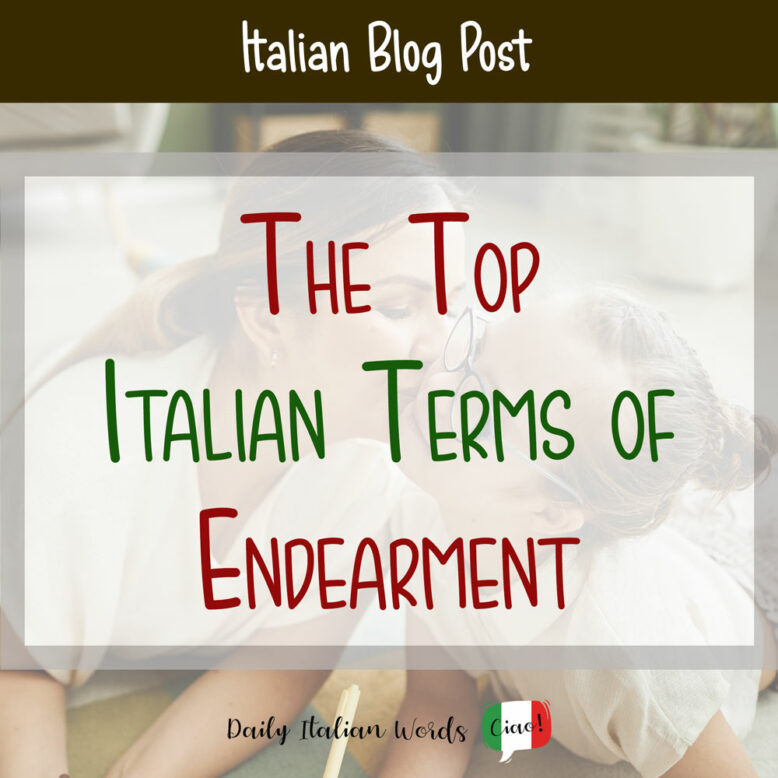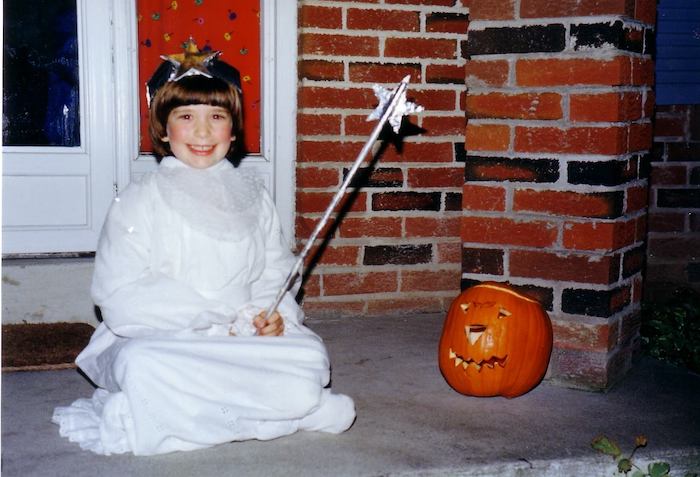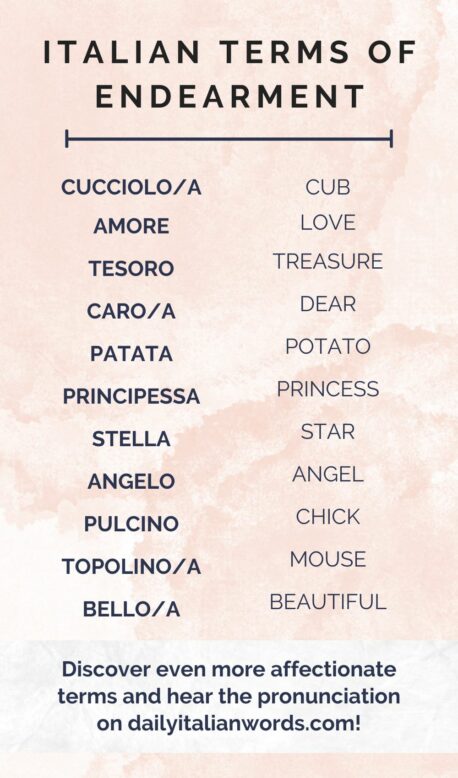Every language has its own set of terms of endearment (nomignoli affettuosi), with popular terms varying from culture to culture. They are a fun way, not only to express your feelings for your partner, friend or child, but also to establish a level of comfort and closeness in the relationship.
Italian happens to be one of the more expressive languages I’ve encountered in terms of the sheer variety of pet names that exist. (No doubt this is because Italians are such warm and friendly people!) In addition to the standard amore (love) and bello/a (beautiful), there are literally dozens of other nicknames that run the gamut from the cute to the downright unusual.
In this article, we’ve compiled some of the most commonly used Italian terms of endearment. Some can be used with anyone you care for, whereas others have a more limited use, which is why we’ve divided them up into the following four categories: lovers (boyfriends, husbands, wives and girlfriends), children and friends.
Important: Italians tend to get very creative with their terms of endearment, often inventing their own based on animals, food and even insults! The list here is simply a summary of the most popular terms, not necessarily what you might hear or find yourself being called. 😃

Cute Italian Terms of Endearment for Lovers
This section deals with all the most important pet names for lovers in Italian. The first section is dedicated to boyfriends and husbands, while the second is for wives and girlfriends.
Italian Pet Names for Boyfriend / Husband
Amore
Amore (love) is the default option that many women choose when addressing that special man in their life. Amore mio (my love) and amore bello (beautiful love) are popular variations, although the latter can also be used towards a friend as a joke. You can even combine all the words and say amore mio bello.
Ciao amore, sei tornato a casa presto stasera!
Hi my love, you came home early tonight!
Tesoro
Tesoro (treasure) is a ubiquitous term of endearment that is used not only between lovers but also towards children. Here as well, you can create variations such as tesoro mio and tesoro mio bello.
Ciao tesoro, finalmente sei a casa!
Hy my love, you’re finally home!

Caro
Caro (dear) is another one of those terms that can be used with almost anyone you care about. When used towards your romantic partner, it can sound a little more stiff and formal than the other options mentioned here.
Many Italians add mio onto the end to create caro mio (my dear). Note that it can also be used in an ironic or sarcastic tone. You can invert the words as well (mio caro).
Caro, che ne dici se usciamo stasera?
My darling, what do you say we go out tonight?
Cucciolo
A cute Italian nickname for a boyfriend / husband that I always use is cucciolo (cub). I prefer it to many of the options here because it is more playful and sweet. If I’m feeling really affectionate, I might also stick the suffix -one onto the end to turn it into cucciolone (big cub). Here as well, you can play with additional words such as mio or bello.
Ti amo tanto, cucciolone mio!
I love you so much, my big love!

Italian Pet Names for for Girlfriend / Wife
Amore / Tesoro
You can use these words as terms of endearment, not only for men, but also that lucky lady in your life.
Cara
Just like caro, the feminine cara (dear) is a little more reserved than amore and tesoro but it’s still a safe choice. You may also hear the variations cara mia or mia cara (my dear) which, like the masculine version, can also be used with a bit of sarcasm.
Va bene cara, mi lavo i denti e poi usciamo.
Ok dear, I’ll wash my teeth and we can go out.
Cucciola
I mentioned above that I always call my husband cucciolo and the truth is, he does the same with me using the feminine cucciola (cub) or the diminutive cucciolina (little cub)! Feel free to use this super cute Italian nickname toward your girlfriend or wife as well!
Quindi che cosa vuoi fare, cucciola? Possiamo andare al cinema o fare una passeggiata in centro.
So what do you want to do, my love? We can go to the movies or take a walk downtown.

Patata
The word patata means potato, and by using the diminutive patatina, you are literally calling your loved one a little potato. How cute is that?
You can also use the masculine patato (it doesn’t exist in the dictionary but it can work as a term of endearment) and the augmentative patatone for one’s husband or male partner. Be careful when using the feminine term however, as it has a second more vulgar meaning!
Noi ci chiamiamo sempre patata e patatone!
We always call each other potato and big potato.
Principessa
Italian men who are very romantic love to give their significant other the “royal treatment” by calling her principessa (princess).
Tu sei la mia principessa.
You are my princess.

Additional Italian nicknames for husband / wives / partners:
Below you can find additional terms of endearment for your loved one. Remember that in Italian, there is no limit to creativity and many couples make up their own terms, including negative words to play with humour.
orsacchiotto (teddy bear), maialino/a (little pig), brutta bestia / bestiaccia (ugly monster), paperino/a (little gander), cerbiatto/a (fawn, doe), panzerotto (an Italian savoury turnover), puzzola (polecat) and many more!
Italian Terms of Endearment for a Child
Amore / Tesoro
Yep, you guessed it, amore and its variations amore mio and amore bello are on this list too! The same goes for tesoro from which you can form the common diminutives tesorino (little treasure for a boy) and tesorina (little treasure for a girl).
Cucciolo (for boys) / Cucciola (for girls)
These cute nicknames are a safe bet for children too, as well as their diminutives cucciolino / cucciolina (little cub)!
Piccolo (for boys) / Piccola (for girls)
Piccolo / Piccola literally means small or little which makes it the perfect term of endearment for a young child. You may also hear the diminutives piccolino / piccolina / piccoletto / piccoletta (very small).
E il piccolo, come sta? – Bene grazie, ha cominciato a gattonare proprio ieri!
And the little one, how is he? = Fine, thank you, he started to crawl yesterday.

Stella / Stellina
Stella (star) and its diminutive stellina (little star) can be used as a nickname for very young boys and girls. Note that it remains a feminine noun even when talking about a boy.
Ciao stella, vieni a giocare con noi?
Hi sweetie, are you coming to play with us?
Patatino (for boys) / Patatina (for girls)
The diminutive terms patatino and patatina come from the word patata (potato), which also happens to be a term of endearment. However because children are small, the diminutives are usually preferred. As we explained above, be careful when using patatina as it has another more vulgar meaning.
Ma che dolce che sei, patatino!
You are so sweet, little cutie!
Angelo
The word angelo (angel) is pretty self-explanatory! You may also hear the diminutive angioletto for children.
Tu sei il mio angelo!
You’re my angel!

Pulcino
Pulcino literally means chick but it can be used as a sweet nickname to refer to young children as well.
La mamma tiene il suo pulcino in braccio.
The mother is holding her child in her arms.
Topolino (for boys) / Topolina (for girls)
Topolino and topolina are the diminutive forms of the word topo (mouse), so they literally translate as little mouse. Interestingly Topolino and Topolina are what the Italians call the cartoon characters Mickey and Minnie Mouse!
Brava topolina! Che bel disegno che hai fatto!
Well done, sweetie. What a beautiful drawing you made!
Gattino (for boys) / Gattina (for girls)
The diminutives of gatto (cat), which are gattino and gattina, can work as possible nicknames for children too!
Vieni qua gattino, è ora di fare il bagno!
Come here little cat, it’s time for a bath!

As you can imagine, there are a lot more nicknames for children too. Here are some.
Other cute Italian nicknames for boys:
passerotto (sparrow), tigrotto (tiger)
Other cute Italian nicknames for girls:
bambolina (little doll), farfallina (little butterfly), fragolina (little strawberry), gioia (joy) or bella gioia (beautiful joy)
Italian Terms of Endearment for a Friend
Carissimo (for men) / Carissima (for women)
Although caro / cara (dear) are possible, it is more common for friends to address each other with the emphatic carissimo / carissima (very dear).
Ciao carissimo, come stai? È da un po’ che non ci si vede!
Hi dear, how are you? It’s been a while since I last saw you!
Bello (for men) / Bella (for women)
English people may find this strange but friends in Italy often address one other with the terms of endearment bello / bella (handsome / beautiful) without any sort of romantic intention. You may even hear some women using the emphatic bellissima (very beautiful) towards a good female friend.
Ciao bello, vieni anche tu a vedere la partita?
Hey handsome, are you coming to see the game too?
Grande
One nickname my husband often uses with his male friends is grande which can translate in many ways including big, great, and excellent. It is similar to saying dude, man (US) or mate (UK) in English.
Ciao grande, ci vediamo domani per una birra!
Bye man, see you tomorrow for a pint!

Ciccio (for men) / Ciccia (for women)
One final term that is often exchanged between friends is the friendly ciccio / ciccia. This word is typical of central Italy, whereas in other regions, the meaning may differ. For example, in the north, ciccio is a possible synonym for ciccione (chubby) whereas in Sicily, it is the diminutive of the name Francesco.
Dai ciccio, passo a prenderti fra venti minuti.
Ok man, I’ll come pick you up in twenty minutes.
Can you think of any other Italian terms of endearment that we should add to this list? Which of these do you plan to use with your friends and family? Let us know in the comments below! 🙂

Heather Broster is a graduate with honours in linguistics from the University of Western Ontario. She is an aspiring polyglot, proficient in English and Italian, as well as Japanese, Welsh, and French to varying degrees of fluency. Originally from Toronto, Heather has resided in various countries, notably Italy for a period of six years. Her primary focus lies in the fields of language acquisition, education, and bilingual instruction.


